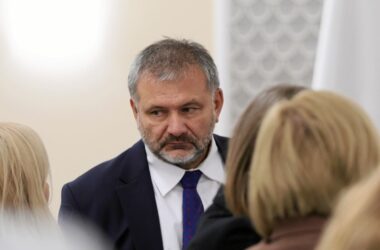A dispute between the Pilecki Institute’s director and its Berlin branch led to the dismissal of a key liaison officer and the shutdown of a Polish‑German cooperation office, damaging relations between Berlin and Warsaw.
Conflict Over the Pilecki Institute
Warsaw correspondent Gabriele Lesser of the “Tageszeitung” (TAZ) described the conflict that broke out between the Pilecki Institute’s director, Krzysztof Ruchniewicz, and the head of its Berlin branch, Hanna Radziejowska.
Dismissal of Berlin Branch Director
The clash resulted in Radziejowska’s dismissal and the Polish Ministry of Foreign Affairs (MSZ)’s decision to close the office of the commissioner for Polish‑German social and cross‑border cooperation, a role also handled by Ruchniewicz. Lesser called the move “a blow to the German‑Polish friendship.”
Controversial Seminar Series
In TAZ, the reason for the dispute was Radziejowska’s letter to the Ministry of Culture – which she also forwarded to the MSZ – protesting a series of seminars proposed by Ruchniewicz. She claimed the seminars would focus on the “return of cultural goods from Poland to Germany, Ukraine, Belarus, and Lithuania” and on “property belonging to people of Jewish origin.” In reality, Ruchniewicz said the seminars were meant to study the provenance of various cultural artifacts.
Media Fire‑storm
According to TAZ, the letter slipped into the circulation of the newspaper “Rzeczpospolita” where right‑wing politicians and media launched a campaign against the historian, accusing him of a “diplomatic betrayal.”
Foreign Minister Sikorski’s Decision
MSZ Secretary‑General Radosław Sikorski responded by abolishing the commissioner’s office “without a single word of justification,” says Lesser. “For the German side, it was a complete shock.” The German commissioner, Knut Abraham, lost his Polish counterpart after the pair’s negotiations ceased.
Damage to Polish‑German Relations
“The case severely harmed Polish‑German relations,” the German journalist assessed. Radziejowska, who had headed the Berlin branch since 2019, could not find common with Ruchniewicz, who had been appointed by former Prime Minister Donald Tusk. “Ruchniewicz had been tasked with depoliticising the Institute, whose profile was largely shaped by the national‑populist ideology of the ruling party,” the article added.
Final Words
Lesser concluded by asking, “Who will apologize to Ruchniewicz and to the Germans for the blow to the German‑Polish friendship?”










